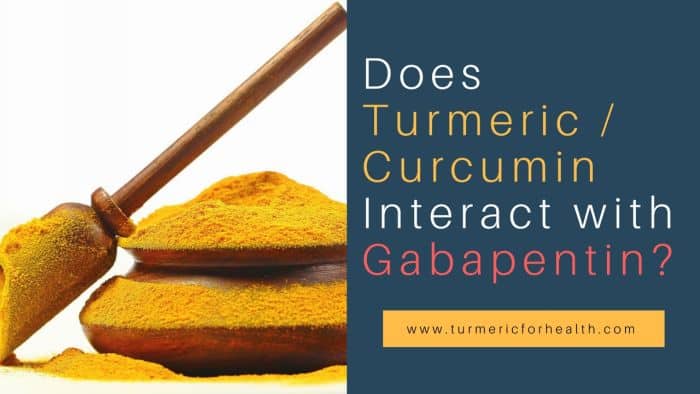Quick Answer
Gabapentin is a drug commonly used to treat neuropathic pain, seizures, epilepsy, anxiety, and hot flashes by inhibiting the calcium channels. Turmeric also has a similar therapeutic effect. No studies are available reporting the adverse health effects of consuming turmeric together with gabapentin. However, it is safer to maintain a gap of 3-4 hours if planning to take turmeric with gabapentin.
There are no known adverse interactions between turmeric and gabapentin. It is safe to consume turmeric in the diet when on gabapentin drugs. However, if taking supplemental doses of turmeric or curcumin, it is better to maintain a gap of 3-4 hours with gabapentin, to avoid any possible interaction.
Gabapentin is sold under various names and used as a medication used to treat epilepsy, neuropathic pain, hot flashes, and restless legs syndrome.
Turmeric and gabapentin have similar pharmacological action, and thus, the possibility of use of turmeric along with gabapentin for better and safer treatment outcomes cannot be ignored. But these benefits are not directly proved by research yet.
Read: 100 Evidence-Based Health Benefits of Turmeric
Let us now know more about these effects along with the scientific evidence.
Table of Contents
Does Turmeric Interact with Gabapentin?
There are no known interactions between gabapentin and turmeric. In fact, there is a possibility that taking turmeric may actually help.
1. Turmeric and gabapentin have similar therapeutic effects
Gabapentin or Neurontin (brand) is drug commonly used to treat neuropathic pain, seizures, epilepsy, anxiety, and hot flashes. Its mechanism of action includes the inhibition of calcium channels and synapse formation in the central nervous system. [1] [2]
Turmeric and its active compound curcumin have been found to have beneficial effects in several neurological disorders including Alzheimer’s disease, epilepsy, and depression. It can also prevent and treat nerve damage and neuropathic pain in diabetes. [3]
It also displays these neuroprotective effects by blocking the calcium channels, which is similar to the effects of gabapentin. [4] [5] [6]
This suggests the possibility of turmeric use along with gabapentin for an improved therapeutic effect.
Studies have also reported curcumin to be more efficient in treating diabetic neuropathy than gabapentin. [7]
Moreover, gabapentin therapy has a risk of serious adverse effects, while turmeric is safe, well-tolerated and devoid of such severe implications.
Thus, turmeric might be used as an adjuvant or supplement along with gabapentin treatment. It may also help lower the doses of the drug and its side effects. However, this fact has to be studied further.
2. Turmeric may interact with pharmacokinetics of some drugs
There are hardly any studies which report adverse health effects of consuming turmeric together with gabapentin.
However, there is some evidence regarding the effects of turmeric and piperine on the metabolism and absorption of some drugs.
Piperine is a vital component of black pepper, used to enhance turmeric’s bioavailability. [8]
Turmeric inhibits the Cytochrome P450 enzyme and p-glycoprotein, both of which are actively involved in drug metabolism in the intestines. Decreased metabolism of drugs may reduce therapeutic effect while making drugs to remain in the body for a longer time. This may also increase the duration of side effects. [9] [10] [11]
Piperine increases drug absorption, which in long-term can also elevate the adverse effects on health. [12]
However, these are laboratory studies and more studies to examine these effects in human and with gabapentin, in particular, are needed to reach a definite conclusion.
Also, studies examining possible herb-drug interactions report no significant adverse effects of consuming turmeric with anti-depressants, sedatives, antiepileptic, anti-seizure and Alzheimer’s drugs in the short term. [13] [14]
How to Take Turmeric
One of the best ways to take turmeric is by making the golden paste (recipe here). Golden paste ensures that the turmeric taken in properly absorbed in the body.
In case you are not sure which turmeric brands are good, you can check the list of our recommended brands here>
Consumption of turmeric in the diet is entirely safe, as small amounts of turmeric and curcumin are unlikely to have any significant adverse effects. However, if you plan to take turmeric or curcumin supplements, maintain a gap of 3-4 hours is preferred to avoid possible herb-drug interactions.
Also, do consult your doctor before including any herb including turmeric in your diet in substantial amounts, especially if you have a health condition or are on medications.
Have you taken turmeric along with Gabapentin? What was your experience? Please share by commenting below. Will be of great help to all our readers.
FAQs
Preclinical studies showed that curcumin possesses an anti-epileptogenic activity and it may reduce spontaneous recurrent seizures. In addition, it may reverse oxidative stress and cognitive impairment. However, its poor bioavailability limits its use. More studies are warranted in the future.
Curcumin, an active component of turmeric, has potent neuroprotective properties. Likewise, gabapentin is neuroprotective through glutamate receptor-independent mechanisms. Both curcumin and gabapentin may be used to treat diabetic neuropathy. Future studies will determine if turmeric can be had with gabapentin.
Curcumin may have neuroprotective properties against Alzheimer’s disease, major depression, epilepsy, and other neurodegenerative diseases. It may be due to its anti-inflammatory and antioxidant properties. It may modulate various neurotransmitter levels, enhance levels of neurotrophic factors, and prevent cell death.


A quick history. I was hurt in a military accident 34 years ago. I have
severe arthritis and neuropathy. I take 2400mg Gabapentin daily,and 500 to 1000mg Turmeric daily. I usually leave an hour gap
between,but even at the same time,i have never had a reaction. I am 60 years old,and take several other meds,and no reaction ever with turmeric.
Hi Paul. Thank you for sharing your experience.